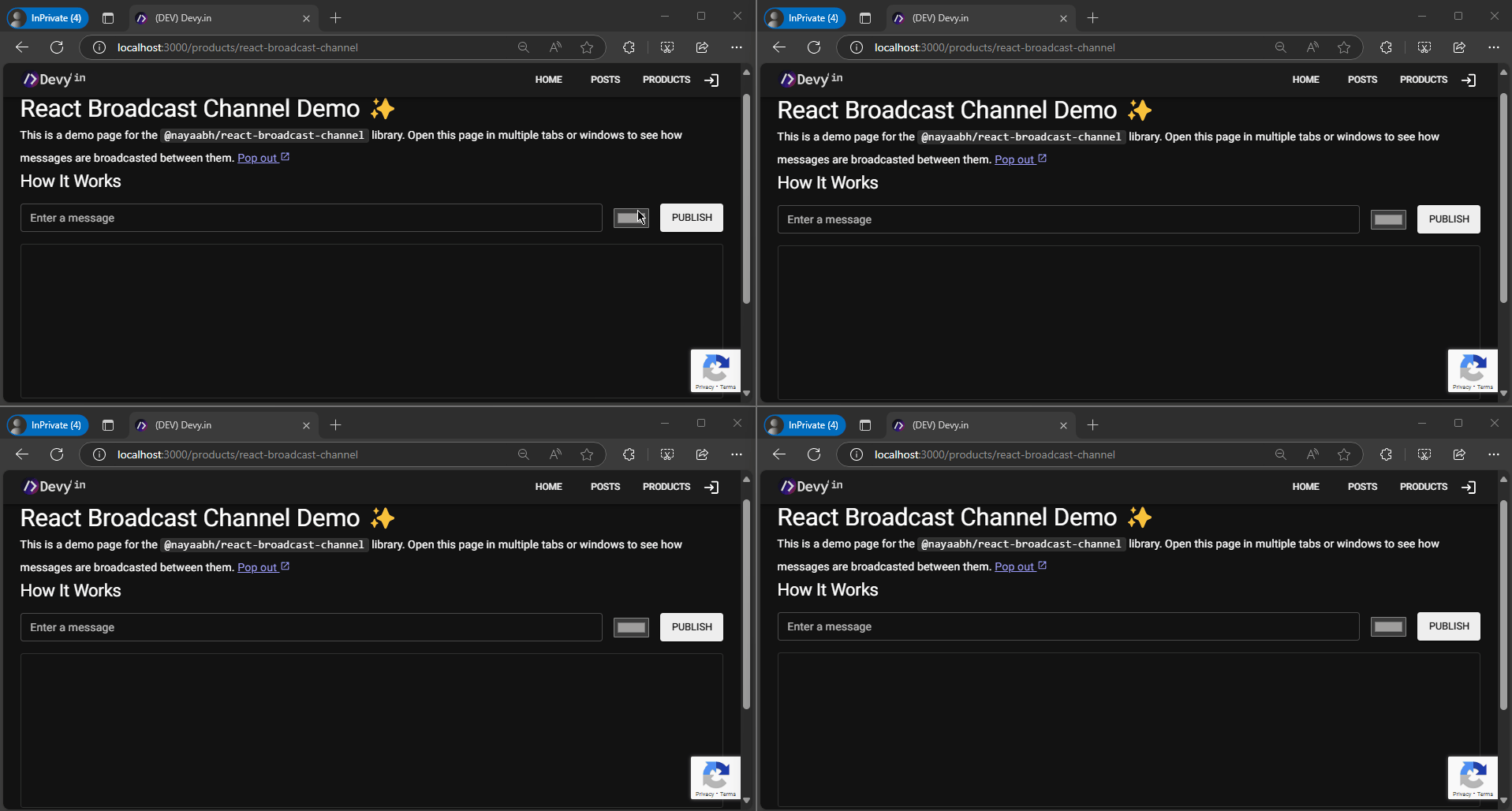React Broadcast Channel
A lightweight, intuitive, and scalable library for broadcasting messages between components, tabs, iframes, and windows. It empowers developers to share low-latency data and states effortlessly across different parts of an application or between multiple windows, using simple react hooks.
It uses
BroadcastChannel APIunder the hood.
Key Features
- Low-Latency Data Sharing: Share data instantly between components, tabs, iframes, and windows without polling or server-side communication.
- Cross-Windows Messaging: Send messages between components, tabs, iframes, and windows seamlessly.
- Effortless State Management: Manage state changes across your application with our intuitive
useBroadcastStatehook.
Demo

Installation
npm install @nayaabh/react-broadcast-channel
Getting Started
useBroadcastState
This hook provides a stateful way to manage the current message received from the channel. It returns an array with two elements: the current message state object and a function to send a new message.
"use client";
import { useBroadcastState } from "@nayaabh/react-broadcast-channel";
import { useCallback, useEffect, useState } from "react";
const CHANNEL_NAME = "BroadcastChannel-001";
export const BroadcastPlayBox = () => {
const [message, setMessage] = useBroadcastState<string>(CHANNEL_NAME);
const [logs, setLogs] = useState<string[]>([]);
const onPublish = useCallback((e: any) => {
e.preventDefault();
const data = new FormData(e.target);
const text = data.get("message") as string;
const dateTime = getTimestamp();
// Send message to all connected clients
setMessage(`${dateTime} - ${text}`);
}, []);
useEffect(() => {
if (message) {
setLogs((logs) => [message, ...logs]);
}
}, [message]);
return (
<>
<form onSubmit={onPublish}>
<label htmlFor="message">Enter your message:</label>
<input name="message" />
<button type="submit">Publish</button>
</form>
<ol>
{logs.map((log) => (
<li key={log}>
<pre>{log}</pre>
</li>
))}
</ol>
</>
);
};
function getTimestamp() {
const date = new Date();
const year = date.getFullYear();
const month = `${date.getMonth() + 1}`.padStart(2, "0");
const day = `${date.getDate()}`.padStart(2, "0");
const hour = `${date.getHours()}`.padStart(2, "0");
const minute = `${date.getMinutes()}`.padStart(2, "0");
const second = `${date.getSeconds()}`.padStart(2, "0");
const millisecond = `${date.getMilliseconds()}`.padStart(2, "0");
return `${year}-${month}-${day} ${hour}:${minute}:${second}.${millisecond}`;
}
useBroadcastChannel
This hook provides a way to post messages to the channel and handle incoming messages using callbacks. It takes a channel name and an optional callback function to handle incoming messages.
"use client";
import { useBroadcastChannel } from "@nayaabh/react-broadcast-channel";
import { useCallback, useState } from "react";
const CHANNEL_NAME = "BroadcastChannel-001";
export const BroadcastPlayBox = () => {
const [logs, setLogs] = useState<string[]>([]);
const appendLogs = (message: string | null) => {
if (message) {
setLogs((logs) => [message, ...logs]);
}
};
const [postMessage] = useBroadcastChannel<string>(CHANNEL_NAME, appendLogs);
const onPublish = useCallback((e: any) => {
e.preventDefault();
const data = new FormData(e.target);
const text = data.get("message") as string;
const log = `${getTimestamp()} - ${text}`;
postMessage(log); // Send message to all connected clients
setLogs((logs) => [log, ...logs]); // update local state
}, []);
return (
<>
<form onSubmit={onPublish}>
<label htmlFor="message">Enter your message:</label>
<input name="message" />
<button type="submit">Publish</button>
</form>
<ol>
{logs.map((log) => (
<li key={log}>
<pre>{log}</pre>
</li>
))}
</ol>
</>
);
};
function getTimestamp() {
const date = new Date();
const year = date.getFullYear();
const month = `${date.getMonth() + 1}`.padStart(2, "0");
const day = `${date.getDate()}`.padStart(2, "0");
const hour = `${date.getHours()}`.padStart(2, "0");
const minute = `${date.getMinutes()}`.padStart(2, "0");
const second = `${date.getSeconds()}`.padStart(2, "0");
const millisecond = `${date.getMilliseconds()}`.padStart(2, "0");
return `${year}-${month}-${day} ${hour}:${minute}:${second}.${millisecond}`;
}
API Reference
useBroadcastChannel(channelName: string, onMessage: (message: T | null) => void = () => {}): BroadcastChannelProps<T>
- Creates a new
BroadcastChannelinstance with the specified channel name. - The
onMessagecallback is called whenever a message is received from another client. - Returns:
[postMessage, closeChannel]:postMessagesends a message to all connected clientscloseChannelcloses the channel.
useBroadcastState(channelName: string): BroadcastStateProps<T>
- Provides a stateful hook for managing messages in a broadcast channel.
- Returns:
[message, sendMessage]messageis the current messagesendMessageis a function to send a new message.
References
✨Demo 🚀